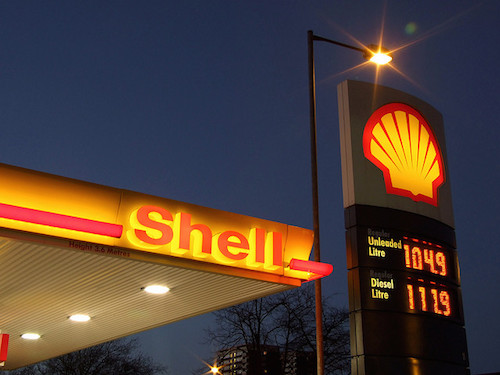‘Does it have a mini-mart? A small supermarket, fits inside a garage, sells antifreeze and pasties, that type of thing?’. The words of Alan Partridge back in 1997. One of the most loved traits of Partridge is his ability to highlight the absurdity of the banal. Partridge is in thrall to modernism but the modernism of the mundane is all that he can access, hence his affection for the supermarket-cum-garage.
I’m Alan Partridge arrived during a tipping point for the forecourt shop. In the 1990s a petrol station with a supermarket was a sophisticated new metropolitan invention and as such it was a staple of stand up comedy routines – the gold standard being Eddie Izzard’s surreal queue of murderers waiting at the late night petrol station’s hatch to buy a Twix. Petrol dispensing was, though, still an artisanal affair in many places in 1997.
For example, the petrol stations of my youth, far away from Birmingham:
There were two pumps. You drove in, your tyres crossed the pneumatic tube which made the bell ring and a young guy came out. “Fill her up please, with four star” you’d say. Some light chat, perhaps about the news, weather or football, then when you were done you’d pop in to the little office. You’d hand over a few notes or perhaps you’d “book it” (my local garage was the sort of place that did things on account). There might be a few packets of sweets at the counter, and sundry motoring consumables like oil, tax disc holders and road atlases.
Those were the petrol stations of my youth. Those places were dying off in the 1990s though and the newer garages had more pumps, car parking, a cash point and where the small office used to be, there was a shop.
On my very first night in Birmingham, in 1997 as it goes, I arrived at the university’s halls of residence in Perry Barr at about ten at night. I asked the girl who gave me my keys if there was a late night shop still open so I could get a cold drink and a snack. I was of course directed to a petrol station down the road. In Birmingham the petrol station had become the default mode of convenience shopping, somewhere you could walk to. This was Partridge’s England, this was his modernity, this was his progress.
Nowadays when I go to the petrol station it’s almost assumed I haven’t come for fuel. “Any fuel with that today?” they ask as they bag my Hovis, my ready meal and its accompanying meal deal wine. And I’ve buzzed through that shop – for it’s now a full blown shop they have at the garage, a Tesco store carrying everything I need – collecting those things in no time at all; in as much time as it used to take to pick up a pack of wine gums and book a tenner’s worth of petrol to my parent’s account I can fuel up and grab a basket full of groceries. That’s why I’m pretty upset when this bloke storms in and says “Is that your fucking Megané? Will you shift it I want some fucking petrol.” “Mate” I say “this is a supermarket, back off this is how it works now.” He looks confused and a little ashamed as the other shoppers turn and glare at him, their baskets full of crumpets, pre-packaged sushi, Foster’s lager and Kettle Chips. He throws his hands up in the air and storms back out again.
And that’s a true story that took place at the Tesco in the Esso next to the Yenton in Erdington. Thinking back on it now I worry about that guy. Not for his impotent rage but because he’s set against the march of progress. He’s the same guy whose pub has been turned into a buffet Chinese restaurant. He’s the guy whose nightclub is going to be turned into another coffee shop. He’s the guy who’d like a toasted teacake but there’s only fucking lovely cup cakes.
The forecourt office became a shop and then those shops became supermarkets. Systematically the big supermarkets dismantled an industry: the independent petrol station. I’m almost surprised we don’t have a slow fuel movement, lobbying to bring it all back. But we don’t. And although we have all read endless pieces in the newspapers about the supermarkets muscling in on books and DVDs or clothes and homeware, we never saw the broadsheet columnists standing up for the independently owned Texaco franchise. That’s because there’s a little bit of Partridge in all of us, I think, a little bit of us that’s excited by the small supermarket that fits in a garage. And we get excited about all of this thanks, of course, to Birmingham.
Because you see Partridge’s mini-mart owed its existence to the microwave oven which was the centrepiece of the shop. Here one could heat all manner of convenience goods sold within the store (as Alan often did). The microwave oven is an application of the cavity magnetron, invented in Birmingham in 1940 by John Randall and Henry Boot. Without the microwave oven the forecourt shop would have been grim indeed, but with it in place it gained a seductive modern air. Furthermore we can see that the push on to the development of larger shops, those little Tescos they have now, is also linked to this fine Brummie invention. For what is the little Tescos for if it is not for the sale of microwave ready meals, with a pudding, side and a bottle of wine for only £10? What you think this is a petrol station? Get a grip mate, and pop down the Chinese buffet for a pint.
Image CC: Lee Jordan

